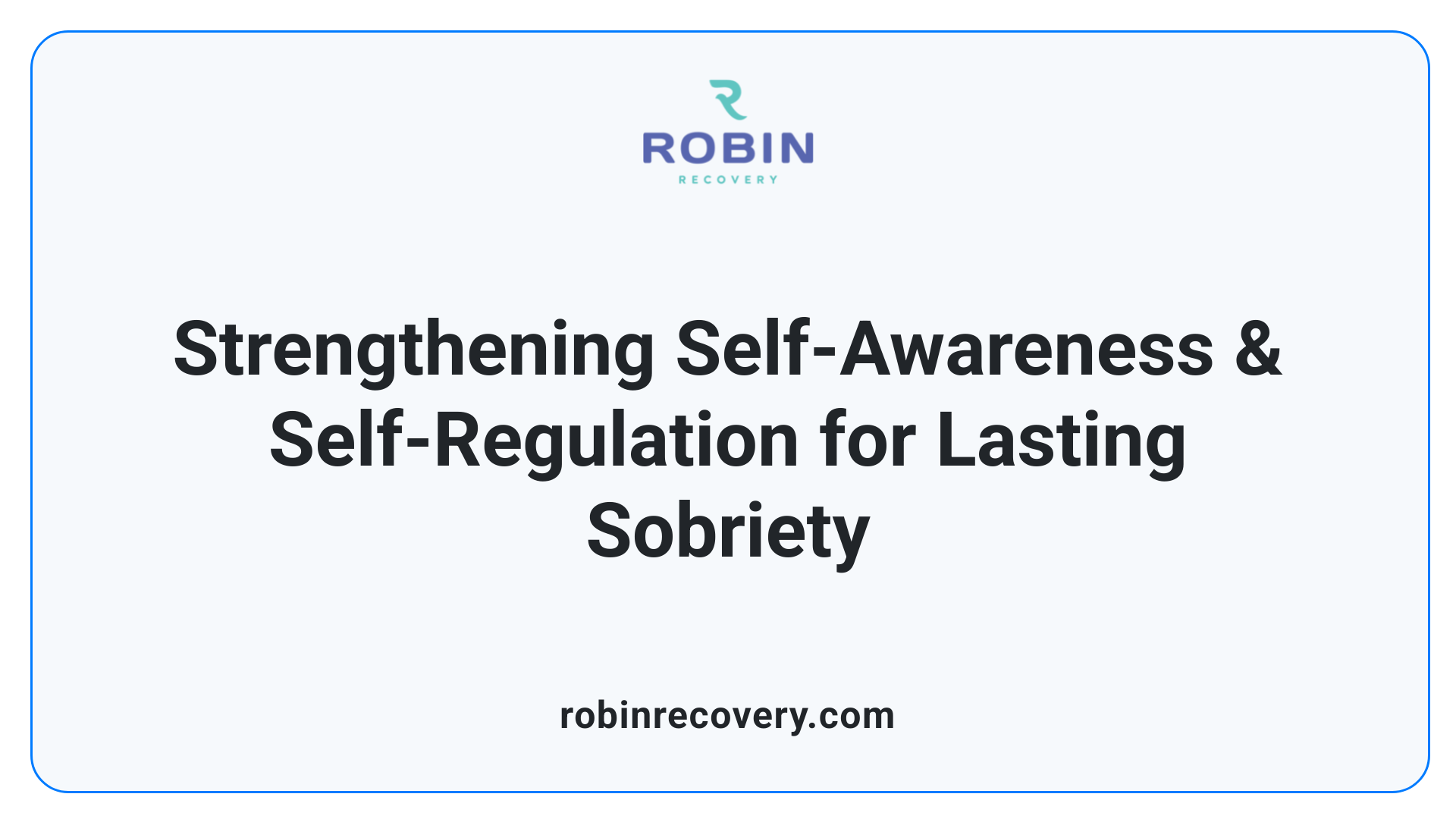How to Build Emotional Intelligence in Recovery

Introduction to Emotional Intelligence in Recovery
Emotional intelligence (EI) is a vital skill for individuals navigating the path of addiction recovery. It involves the ability to recognize, understand, and manage one's emotions while empathizing with others, which is key to managing stress and forming healthy relationships. Developing emotional intelligence can significantly aid in recovery by preventing relapse and promoting mental well-being. In this article, we explore the components of EI and practical techniques for enhancing it within the recovery context.
Understanding Emotional Intelligence in the Context of Recovery

What is emotional intelligence in recovery?
Emotional intelligence in recovery refers to the ability to recognize, understand, and manage one's emotions and the emotions of others. This skill is crucial in addiction recovery, as it helps individuals navigate the complex feelings that may arise during their healing process.
By developing emotional intelligence, individuals can identify triggers for cravings, cope with stress and anxiety, and build healthy relationships. This is essential since addiction often alters brain chemistry, leading to challenges such as mood swings and heightened emotional responses.
Impact on managing emotions and relationships
Cultivating emotional intelligence enhances several components vital to ongoing sobriety:
- Self-awareness: This enables individuals to understand their emotional triggers and patterns, decreasing anxiety and improving decision-making.
- Self-regulation: Learning to manage disruptive emotions helps in coping with stress without resorting to substance use.
- Empathy: Strengthening this ability fosters connections with others, providing essential social support that is critical for recovery.
- Social skills: Developing these skills leads to healthier interactions and enhanced conflict resolution, reducing feelings of isolation.
Incorporating emotional intelligence techniques, such as mindfulness and active listening, can significantly improve an individual’s recovery journey. These skills not only facilitate better emotional management but also strengthen the networks needed for ongoing support.
Components of Emotional Intelligence Essential for Recovery

What are the main elements of emotional intelligence?
Emotional intelligence (EI) consists of five main components:
- Self-Awareness
- Recognizing and understanding your own emotions, their triggers, and their effects on others.
- Self-Regulation
- Managing disruptive emotions and reactions, maintaining control over impulses, particularly during stressful situations.
- Motivation
- Driven by internal goals and values, which helps sustain commitment to personal recovery goals.
- Empathy
- Understanding and connecting with the emotions of others, which plays a significant role in building supportive relationships during recovery.
- Social Skills
- Effective communication and conflict resolution abilities that enhance interpersonal connections.
Why is emotional intelligence important in recovery?
Developing emotional intelligence is essential for addiction recovery because it equips individuals with the skills needed to manage their emotions and avoid relapse. The interplay between addiction and emotional struggles often complicates recovery; thus, these EI components foster resilience and emotional healing. For instance, self-awareness aids in identifying triggers that lead to substance use, while self-regulation helps control stress responses. Social skills are vital for rebuilding relationships damaged by addiction, reducing isolation. Furthermore, empathy and motivation not only support connections with others but also reinforce personal commitment, driving sustained recovery efforts. In essence, enhancing EI not only empowers individuals to cope with emotions effectively but also strengthens their journey towards long-term sobriety.
Enhancing Self-Awareness and Self-Regulation Skills

How can self-awareness and self-regulation aid in recovery?
Self-awareness and self-regulation are critical skills in the recovery process. Self-awareness involves recognizing one's emotions and understanding how they influence behavior. This clarity helps individuals identify emotional triggers that may lead to substance use. By becoming aware of these triggers, individuals can make conscious choices to avoid relapse and manage their responses.
Self-regulation, on the other hand, focuses on managing emotional responses effectively. This includes preventing impulsive reactions that can arise during stress or cravings. By cultivating self-regulation, individuals learn to cope with strong emotions without resorting to substances.
Practical Techniques for Improvement
To enhance self-awareness and self-regulation skills, various techniques can be employed:
- Mindfulness Meditation: Helps individuals stay present and recognize their feelings as they arise, allowing for thoughtful responses.
- Journaling: Encourages reflection on emotional triggers and responses, fostering self-discovery and understanding.
- Cognitive-Behavioral Therapy (CBT): Teaches individuals how to challenge negative thought patterns and develop healthier emotional responses.
Through consistent practice of these techniques, individuals can strengthen their emotional intelligence, ultimately supporting their journey in recovery.
The Role of Empathy and Social Skills in Recovery

How do empathy and social skills contribute to recovery?
Empathy and social skills are fundamental components of emotional intelligence that significantly support recovery. When individuals cultivate empathy, they can connect with others on a deeper emotional level. This connection fosters supportive relationships that are essential for healing and can greatly enhance the recovery process.
Building strong social skills enables individuals to communicate effectively, an important aspect in recovery where expressing emotions and needs is crucial. These skills also assist in conflict resolution, which can prevent misunderstandings that may lead to stress or feelings of isolation.
Furthermore, the development of social networks promotes accountability and offers a sense of belonging, both of which are vital for sustained recovery. Engaging in group therapy or support sessions fosters these connections, allowing recovering individuals to share experiences and encourage one another. The combination of empathy and social skills not only aids in managing interpersonal relationships but also significantly contributes to the emotional resilience necessary for long-term sobriety.
ComponentImpact on RecoveryKey Functions Empathy Fosters supportive relationships Enhances emotional connections with others Social Skills Facilitates effective communication Aids in conflict resolution and network-building Emotional Resilience Reduces feelings of isolation and stress Promotes accountability and a sense of belonging
Motivation and Intrinsic Drives in Recovery
What motivates individuals to stay committed to recovery?
Motivation, especially intrinsic motivation, is fundamental in addiction recovery. It drives individuals to stay committed to their journey toward sobriety, focusing not just on abstaining from substances but on personal growth and development.
Intrinsic motivation revolves around aligning recovery goals with personal values. When individuals find meaning in their recovery journey, it fosters a sense of fulfillment. For instance, someone who values family may be motivated to stay sober to rebuild relationships with loved ones. This personal connection to recovery enhances self-efficacy, bolstering determination and resilience against the challenges of sobriety.
Setting goals aligned with personal values
Achievable goal setting is another essential strategy in maintaining motivation during recovery. Individuals can enhance their commitment by breaking down their recovery journey into smaller, manageable steps. By achieving these small goals, such as attending a certain number of support group meetings or practicing mindfulness daily, individuals can celebrate progress, reinforcing their motivation.
Developing a clear vision of what recovery means to them can also keep individuals engaged and focused on their path. As a result, the interplay of intrinsic motivation and aligned goals serves as a powerful catalyst for sustained success in the recovery process.
Practical Techniques to Develop Emotional Intelligence

Mindfulness, Therapy, and Healthy Practices
Developing emotional intelligence (EI) is a gradual process that can significantly enhance recovery journeys. One foundational technique is mindfulness, which includes practices like meditation and journaling. These activities help individuals become more aware of their emotions and thoughts, allowing them to manage responses more effectively in stressful situations.
In addition, therapeutic approaches such as Cognitive Behavioral Therapy (CBT) and Dialectical Behavior Therapy (DBT) are invaluable. They provide structured environments for learning emotional regulation and self-reflection, promoting healthier coping strategies. Participating in group therapy also facilitates the cultivation of empathy and social skills through shared experiences.
Real-life Applications for Better Emotional Management
Applying emotional intelligence in daily life can transform recovery experiences. For instance, practicing active listening during interactions can enhance communication skills and relationships with others, fostering a supportive network. This network is crucial for reducing feelings of isolation, a common challenge in recovery.
Another practical approach is regularly evaluating thoughts to distinguish between truths and perceptions, which can help manage emotions effectively. Incorporating healthy coping mechanisms such as physical activity, engaging in hobbies, and seeking feedback can also mitigate stress. These strategies help individuals respond to emotional triggers thoughtfully rather than impulsively, thereby reinforcing their commitment to recovery.
Long-term Benefits of Emotional Intelligence in Recovery
Sustaining Sobriety
Emotional intelligence plays a pivotal role in maintaining sobriety over the long term. It equips individuals with the skills to recognize and manage their emotions, significantly reducing the risk of relapse. By enhancing self-awareness, individuals can identify triggers that might lead to substance use. This awareness allows for proactive coping strategies to address cravings and negative emotions, fostering a more resilient approach to recovery.
Developing self-regulation helps individuals respond to stress without resorting to substances, making emotional management a cornerstone of sustainable recovery. By employing techniques like mindfulness and meditation, those in recovery can engage their emotional responses thoughtfully rather than impulsively, creating healthier patterns in challenging situations.
Improving Mental Health and Relationships
Strengthening emotional intelligence also profoundly impacts mental health and interpersonal relationships. Healthy emotional coping mechanisms promote better mental well-being, reducing symptoms of anxiety and depression often associated with addiction. Emotional intelligence fosters empathy and social skills, enabling individuals to build robust support networks that are vital during recovery.
Additionally, by enhancing communication and conflict resolution skills, emotional intelligence contributes to healthier relationships. This network of support is crucial for emotional resilience, providing encouragement and understanding that can further mitigate the challenges of recovery. Developing these relationships not only helps in overcoming isolation but also enriches personal growth, establishing a solid foundation for long-term sobriety.
Conclusion: Fostering Emotional Intelligence for Lasting Recovery
Emotional intelligence is a transformative skill that can profoundly impact the recovery journey. By enhancing self-awareness, self-regulation, empathy, and social skills, individuals gain the tools necessary to navigate emotional complexities and build healthier relationships. This fosters resilience and promotes a stable, sober lifestyle. While the development of EI is an ongoing process requiring dedication and effort, the resulting improvements in emotional well-being and personal growth make it an essential component of a successful recovery.
References
- Why Emotional Intelligence Is Vital for Recovery
- Building Emotional Intelligence in Addiction Rehab | Grand Falls
- Emotional Intelligence in Recovery: Building Resilience & Wellness
- Building Emotional Intelligence | Anchored Tides Recovery
- Why Is Emotional Intelligence Important in Recovery?
- 7 Ways to Improve Your Emotional Intelligence and Why it's So Vital ...
- Applying Emotional Intelligence to Recovery - NAADAC
- [PDF] Practical Ways to Gain Greater Emotional Intelligence in Recovery
